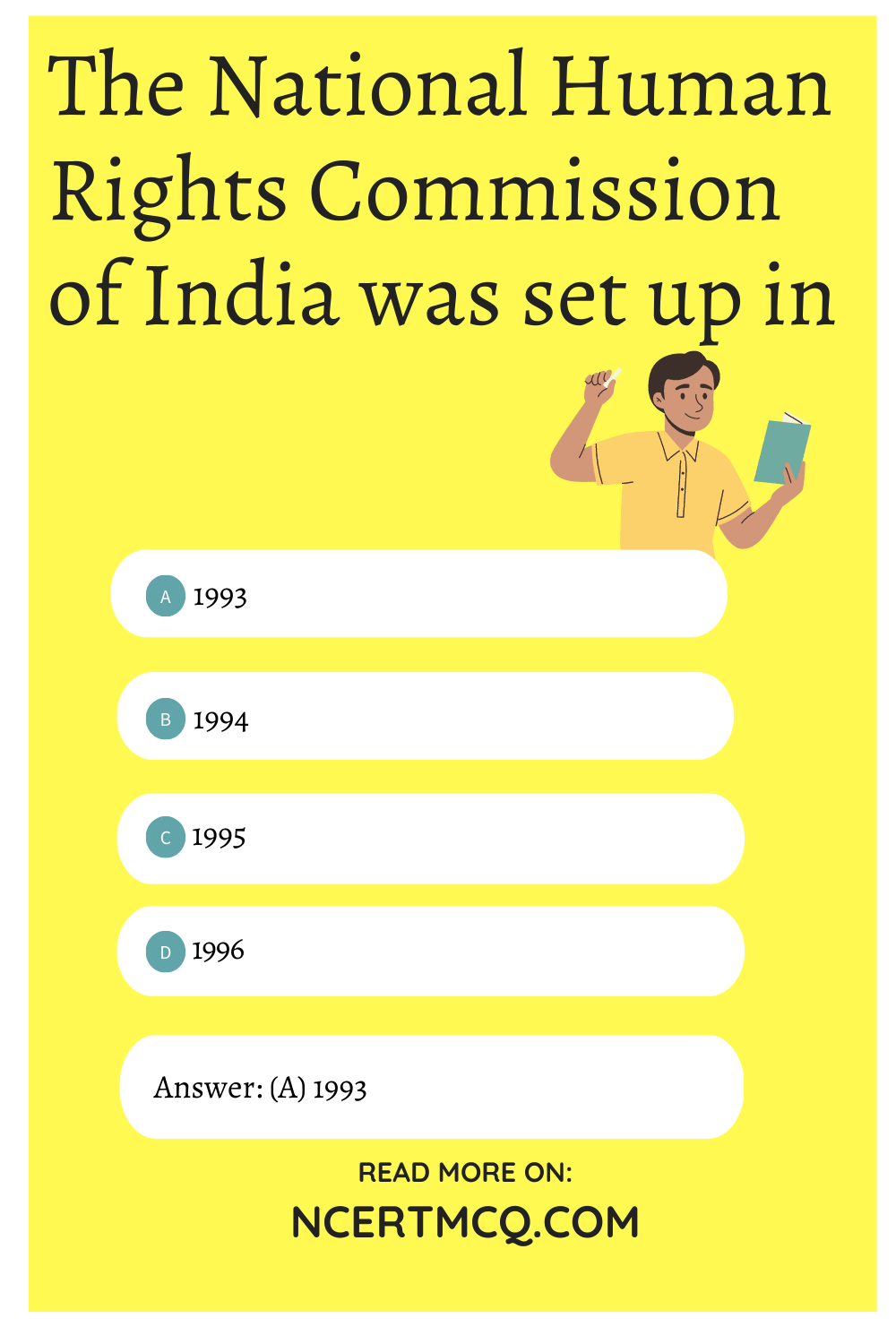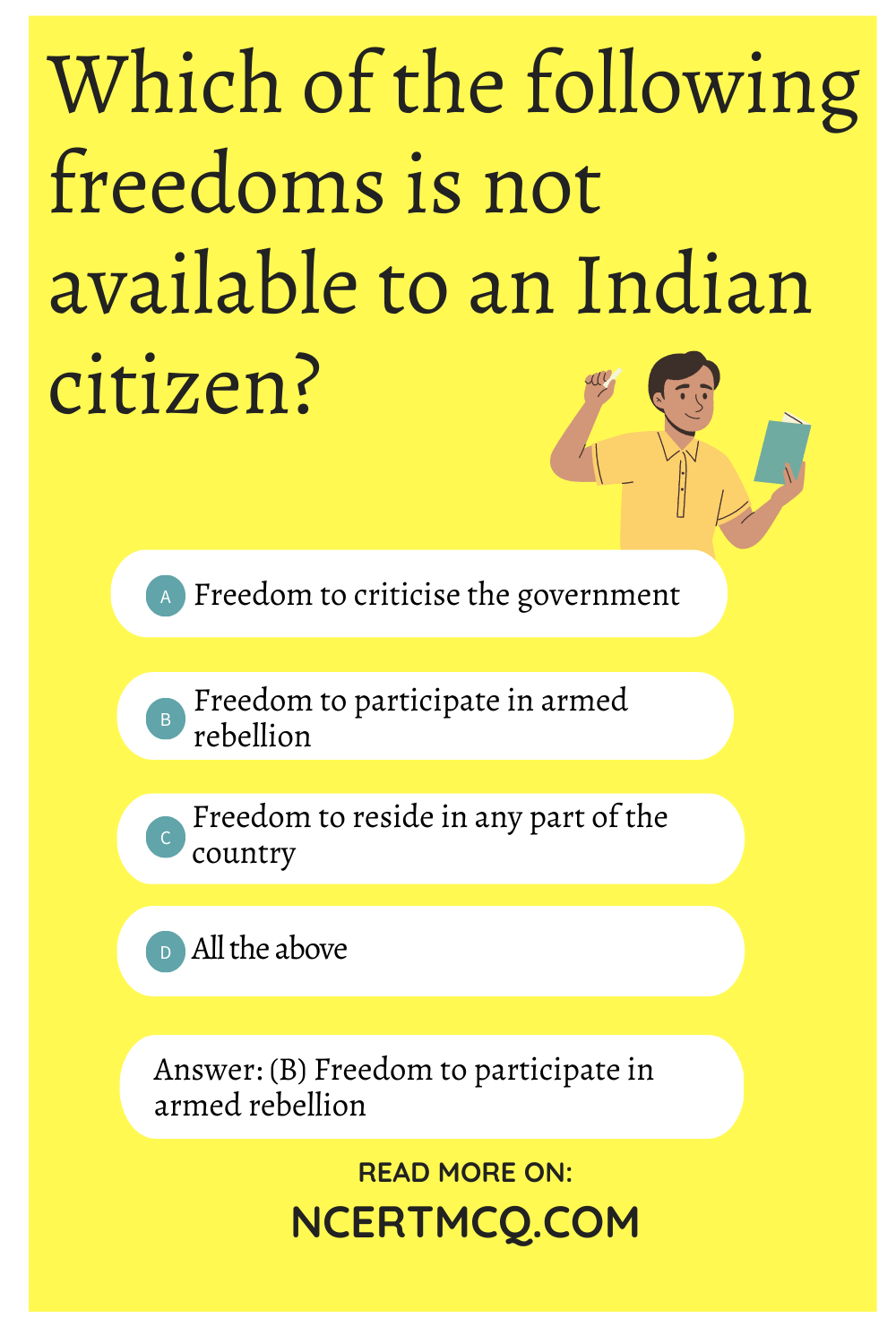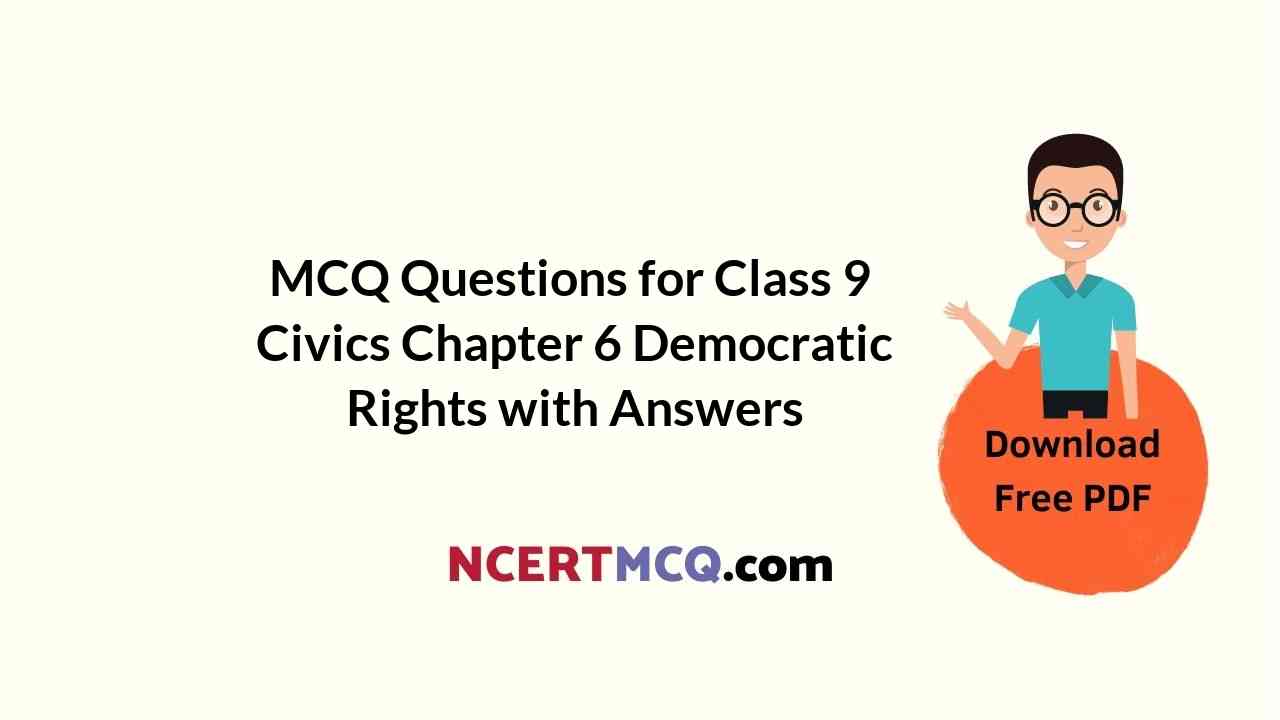Check the below Online Education NCERT MCQ Questions for Class 9 Civics Chapter 6 Democratic Rights with Answers Pdf free download. MCQ Questions for Class 9 Social Science with Answers were prepared based on the latest exam pattern. We have Provided Democratic Rights Class 9 Civics MCQs Questions with Answers to help students understand the concept very well. https://ncertmcq.com/mcq-questions-for-class-9-social-science-with-answers/
Class 9 Social Science Civics Chapter 6 MCQ With Answers
Civics Class 9 Chapter 6 MCQs On Democratic Rights
Choose the correct option:
Democratic Rights Class 9 MCQ With Answers Question 1.
About 600 hundred people from all over the world were put in a prison in Guantanamo Bay by the
(a) US forces
(b) Japanese forces
(c) German forces
(d) British forces
Answer
Answer: (a) US forces
Democratic Rights Class 9 MCQ Question 2.
How many Fundamental Rights do we have?
(a) 6
(b) 7
(c) 8
(d) 9
Answer
Answer: (a) 6
Class 9 Civics Chapter 6 MCQ With Answers Question 3.
Salman Rushdie’s book that has been banned in India on the ground that it is disrespectful to prophet Mohammed is
(a) Mignight’s children
(b) Two years eight months
(c) The moor’s last sigh
(d) The Satami Verses
Answer
Answer: (d) The Satami Verses
MCQ Of Democratic Rights Class 9 Question 4.
Children below the age of cannot be employed in any factory or mine or in any other hazardous work.
(a) 12
(b) 13
(c) 14
(d) 15
Answer
Answer: (c) 14
MCQ On Democratic Rights Class 9 Question 5.
Which of the Fundamental Rights is called ‘the heart and soul’ of the Indian Constitution?
(a) Right to Equality
(b) Right to Freedom of Religion
(c) Right to Constitutional Remedies
(d) Cultural and Educational Rights
Answer
Answer: (c) Right to Constitutional Remedies
Class 9 Democratic Rights MCQ Question 6.
The National Human Rights Commission of India was set up in
(a) 1993
(b) 1994
(c) 1995
(d) 1996
Answer
Answer: (a) 1993

MCQ Questions For Class 9 Social Science With Answers Pdf Download Question 7.
Amnesty international works for
(a) human right
(b) trade unions
(c) poor children
(d) deprived people
Answer
Answer: (a) human right
MCQ Of Sst Class 9 With Answers Question 8.
A person who is arrested and detained shall be produced before the nearest magistrate within a period of hours of arrest.
(a) 20
(b) 22
(c) 23
(d) 24
Answer
Answer: (d) 24
MCQ Class 9 Social Science Question 9.
Which of the following statements is wrong?
(а) We have freedom to travel to any part of the country.
(b) We have freedom of speech and expression.
(c) Untouchability is not a punishable offence.
(d) Everyone is equal before the law.
Answer
Answer: (c) Untouchability is not a punishable offence.
Social MCQ Class 9 Question 10.
The country which denies freedom of religion is
(a) Israel
(b) Saudi Arabia
(c) Iran
(d) Yugoslavia
Answer
Answer: (b) Saudi Arabia
Class 9 Social Science MCQ Questions Question 11.
What was the reason given by America for imprisoning people at Guantanamo Bay?
(a) They had been caught spying.
(b) They were planning to kill the US President.
(c) They were planning to set up a Communist government in USA.
(d) America considered them as enemies and linked them to the attack on New York on 11th September, 2001.
Answer
Answer: (d) America considered them as enemies and linked them to the attack on New York on 11th September, 2001.
MCQ Questions For Class 9 Social Science With Answers Pdf Question 12.
Which of these options is not correct regarding Saudi Arabian political system?
(a) The king selects the executive, legislature and judiciary
(b) Citizens cannot form political parties
(c) There is no freedom of religion
(d) none of the above
Answer
Answer: (d) none of the above
MCQ Questions For Class 9 Social Science Question 13.
What was Milosevic’s attitude towards the Albanians?
(a) His government was hostile to the Kosovo Albanians
(b) He wanted to bring equality between Serbs and Albanians
(c) He wanted Serbs to dominate the Albanians
(d) Both (a) and (c)
Answer
Answer: (d) Both (a) and (c)
MCQ Questions For Class 9 Sst With Answers Question 14.
What is meant by ‘rights’?
(A) One’s demand to get everything without sharing with others
(b) Claims of a person over other fellow beings, society and the government
(c) Not possessing any freedoms
(d) none of the above
Answer
Answer: (b) Claims of a person over other fellow beings, society and the government
MCQ Question For Class 9 Sst Question 15.
Under which Fundamental Right has the Parliament enacted a law giving the Right to Information to the citizens?
(a) Right to freedom of religion
(b) Right to freedom of thought and expression
(c) Right to freedom of equality
(d) Right to constitutional remedies
Answer
Answer: (b) Right to freedom of thought and expression
Social Science Quiz For Class 9 With Answers Question 16.
The right to seek the enforcement of all Fundamental Rights is called:
(a) Right against Exploitation
(b) Right to Freedom
(c) Right to Constitutional Remedies
(d) Cultural and Educational Rights
Answer
Answer: (c) Right to Constitutional Remedies
Question 17.
What did Dr. Ambedkar refer to the ‘Right to Constitutional Remedies’ as?
(a) The brain of our Constitution
(b) The heart and soul of our Constitution
(c) The heart of our Constitution
(d) the soul of our Constitution
Answer
Answer: (b) The heart and soul of our Constitution
Question 18.
When was the NHRC set up?
(a) 1998
(b) 1996
(c) 1993
(d) 2001
Answer
Answer: (c) 1993
Question 19.
Which of the following terms is correct for the feature of the Indian constitution stating that no person is above the law?
(a) State of law
(b) Application of law
(c) Rule of law
(d) Governance by law
Answer
Answer: (c) Rule of law
Question 20.
What does the Constitution say about the practice of untouchability?
(a) It stands abolished
(b) Its practice in any form is punishable by law
(c) Since it is an age-old custom, it should be respected
(d) Both (a) and (b)
Answer
Answer: (d) Both (a) and (b)
Question 21.
Which of these rights is/are provided to a person arrested by the government or police?
(a) To be informed of the reasons of his arrest
(b) To be produced before a magistrate within 24 hrs of his arrest
(c) To engage a lawyer for his defence
(d) All the above
Answer
Answer: (d) All the above
Question 22.
What is meant by ‘begar’?
(a) Practice of begging
(b) Practice of forcing workers to work without any wages
(c) Practice of encouraging workers to work at normal wages
(d) Both (b) and (c)
Answer
Answer: (b) Practice of forcing workers to work without any wages
Question 23.
Which of the following freedom is not available to an Indian citizen?
(a) Freedom to start a movement to change the government
(b) Freedom to oppose the government
(c) Freedom to participate in armed revolution
(d) None of these
Answer
Answer: (c) Freedom to participate in armed revolution
Question 24.
Cultural and Educational Rights are safeguarded mainly for:
(a) Women
(b) minorities
(c) children
(d) Men
Answer
Answer: (b) minorities
Question 25.
Which of the following rights is not available under the fundamental rights?
(a) Right to Equality
(b) Right to Freedom
(b) Right to protect one’s culture
(d) Right to property.
Answer
Answer: (d) Right to property.
Question 26.
Civil Rights are given to the individual by:
(a) Nature
(b) God
(c) The State
(d) The people
Answer
Answer: (c) The State
Question 27.
Who called the right to constitutional remedies as the heart and soul of the constitution?
(a) J.L. Nehru
(b) B. R. Ambedkar
(c) Mahatma Gandhi
(d) Rajendra Prasad
Answer
Answer: (b) B. R. Ambedkar
Question 28.
Which of these is not a freedom available under the ‘Right to Freedom’ in India?
(a) Freedom of speech and expression
(b) Freedom to incite people to rebel against the government
(c) Freedom to assemble in a peaceful manner
(d) Freedom to form associations and unions
Answer
Answer: (b) Freedom to incite people to rebel against the government
Question 29.
Which of the following freedoms is not available to an Indian citizen?
(a) Freedom to criticise the government
(b) Freedom to participate in armed rebellion
(c) Freedom to reside in any part of the country
(d) All the above
Answer
Answer: (b) Freedom to participate in armed rebellion

Question 30.
Which one of the following is not a Political Right?
(a) Right to contest election
(b) Right to vote
(c) Right to seek any political office
(d) Right to freedom
Answer
Answer: (d) Right to freedom
We hope the given NCERT MCQ Questions for Class 9 Civics Chapter 6 Democratic Rights with Answers Pdf free download will help you. If you have any queries regarding Democratic Rights CBSE Class 9 Civics MCQs Multiple Choice Questions with Answers, drop a comment below and we will get back to you soon.
Class 9 Social Science Civics MCQ:
